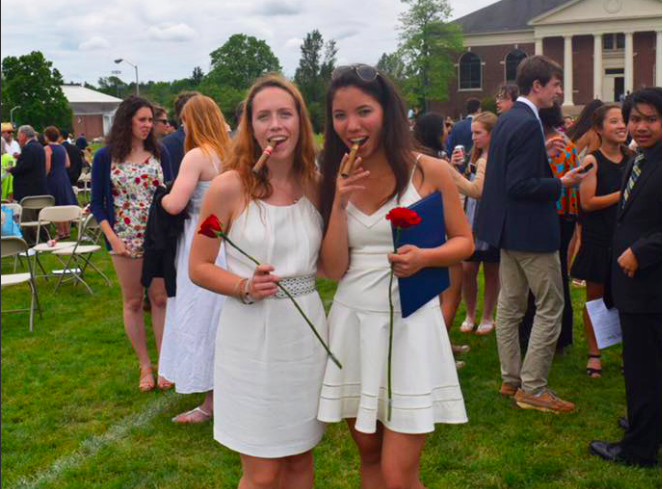Commencement at Choate is a day filled with a plethora of emotions. The first two sensations of the day are joy and sadness; the third is the pungent scent of burning tobacco leaves. Every year on this day, seniors are free from teachers’ authority and cigars are lit around campus.
“It’s kind of an iconic photo to be in a blue suit or a white dress with a red rose and a cigar in the mouth.” Bryce Wachtell ’17 commented. “I remember seeing my prefect in her white dress holding a Cuban cigar, and, by that point, I knew that it was not uncommon for the recent graduates to do so.” Camila Borjesson ’17 agreed, “To many current and past students at Choate, the cigar ceremony is and always will be a picturesque memory.”
Smoking cigars at Commencement has always been a controversial topic. That is also one of the reasons it’s so distinct.
The tradition itself is unofficial, making its origins unknown. “I wish we knew something about the tradition of lighting up a cigar after graduating, but we don’t,” said Choate Rosemary Hall archivist Ms. Judy Donald. “We don’t even know when it started.”
Mr. James Davidson, a longtime faculty member and HPRSS teacher, said, “Cigars at Commencement have been a tradition since long before 1975 — the first graduation I attended at Choate. It has always been seen as a rite of passage at a graduation: like a wedding, it is an event that marks a move to adulthood, or a sign that you have a new ‘status.’”
Ms. Amy Salot, a teacher in the Humanities department, has a different standpoint. She said, “It has been going on since I came to Choate 30 years ago, but I’m not sure I would call it a tradition. I think it is just some graduates’ expression of freedom or rebellion.”
The School’s view on this tradition is necessarily complex. Though the Student Handbook prohibits smoking on campus, this rule applies only to current Choate students, not graduates, however recent. Mr. James Stanley, Dean of Students, declined to comment on this issue.
“I think it’s appropriate because there’s supervision of parents, family members and faculty. Rather than an illicit rebellious act of defiance, it’s more of a landmark in life and a tradition,” Wachtell remarked.
“I do not think it is wrong for individuals who are of age to choose to engage in such behaviors; in fact, I think it is good to experiment,” Borjesson stated. “What I perhaps do disagree with is smoking in the presence of those who have spent so much time and effort reprimanding us students for doing so, such as teachers and deans. If there is anything I regret from the experience of smoking my cigar at school post-graduation, it is seeming like someone who has been waiting four years to be able to smoke in front of her teachers. I understand that can be perceived as rude, and that would be the last impression I would want my teachers to have of me.”
Ms. Salot has a similar perspective as Borjesson. She said, “I guess I disapprove of it because it is the last impression a student leaves. Do you really want that to be the last impression that the faculty and your classmates have of you?”
“The tradition seems harmless to me, frankly,” said Mr. Gordon Armour ’76. “It’s obviously a sort of cultural event. I mean, you have a baby, you give cigars. So, I’ve got no problem with the tradition. If it’s a one-time thing, it seems unlikely to lead somebody into a lifetime of smoking.”
Mr. Armour saw similar traditions firsthand during his own Commencement. He explained, “The school provided big tubs of beer at graduation, but the drinking age was eighteen then, so probably most of the students were of age or at least very close. I frankly don’t remember the cigars, though.”
On the other hand, Joyce Tan ’17 holds a neutral stance towards cigars at Commencement. “I know a lot of people did begin smoking senior year,” Tan stated. “Honestly, I’m neutral towards it. It’s bad for your health, but it’s a personal choice. Personally, I wouldn’t smoke or juul on a regular basis ever again.”
“I chose not to smoke a cigar at Commencement, and only a handful of close friends decided to partake in the tradition,” said Amir Idris ’17. “Personally, I hate inhaling or smelling smoke of any kind, so I had no desire to take part. I don’t judge others for participating, since it’s a way of showing that you’re growing up. But I can also see why encouraging students to smoke is problematic, as it’s a global health issue, and we should do everything we can to end the practice in all forms.”
It is a known fact that Choate is a diverse community that includes students and faculty of different cultures. Students like Borjesson and faculty like Ms. Salot and Mr. Davidson all have their own stories to tell regarding this tradition.
“Back in Madrid, Spain, which is where I am from, the drinking and smoking legislation is much more lenient than it is in America. I have friends my own age who even smoke at home in the vicinity of their parents, even bumming off cigarettes from them at times. My parents were both smokers themselves, so I don’t think it was entirely a surprise to them to see me with a cigar in my hand,” Borjesson stated.
Ms. Salot explained, “I went to a day school, so that may make it different. We did not do anything to mar the importance of graduation itself. That was a formal celebration of all that we had achieved, so no one wanted to take anything away from that.”
“I went to a big city school and graduated in a big auditorium where all smoking was a fire hazard, so the situation was different,” described Mr. Davidson.
Smoking cigars at graduation is prevalent at many other secondary schools. As Wachtell said, “Cigars are associated with the New England boarding school traditional stoic culture” — a mindset larger than Choate Rosemary Hall.




